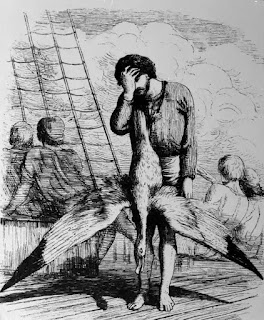It was one of those literary works dubbed "classics" that high-school students in my day were required to read and study, even though we ourselves would never have chosen it for our reading entertainment. It was the exotic, multi-page poem "The Rime of the Ancient Mariner" by Samuel Taylor Coleridge (1772-1834). Even today, literary critics recognize Coleridge as having been one of the most insightful minds of his time.
 |
| The dead albatross hangs from the mariner's neck. |
And all the boards did shrink;
Water, water everywhere
Nor any drop to drink."
Those lines popped into my head when I was reflecting upon some of the disturbing news events during the summer of 2022. In Kentucky, freak floods occurred day after day, killing many. At the same time, in the southwest of the U.S., the level of the Colorado River -- which several states depended upon for water -- had reached a record low. Affected by climate change, the news about water was either "too much" or "too little."
There thus has been no escape from being concerned about water. Even astronomers were searching for signs of it on far-off planets as evidence of the possibility of life elsewhere than on Earth. Along with biologists, astronomers know that the common denominator of all forms of life we know about is water -- that remarkable liquid formed when atoms of the gas hydrogen and the gas oxygen bond together.
The common interest in water during the summer of 2022 (from the people of Kentucky to those living in the Southwest to even astronomers) was a contrast to most of the sentiments expressed publicly during that year. More common had been polarized views that suggested that half of the population of people in the U.S. had nothing at all in common with the other half. But water -- in some way -- became a common concern
 |
| Mariner shoots the albatross with his crossbow |
Samuel Taylor Coleridge wrote at a time when poetry tended to moralize more than it does today. Nevertheless, if he were writing his tale of the mariner today, I would hope he would still include in its final stanzas another set of lines we memorized in high school.
They go like this:
~ ~ ~
(Do any of the lines of Coleridge spark any thoughts or feelings in you?)
(All quotations are from Coleridge's "The Rime of the Ancient Mariner"
taken from The Norton Anthology of English Literature, edited by M.H. Abrams, et al., ©1968.)
(Both pictures are in the public domain.)
2 comments:
I was moved by the last lines you quoted by Coleridge, about loving "all things both great and small." Those words also reminded me of James Herriot's books "All Creatures Great and Small."
So, the mariner had his moral punishment to wear around his neck: the constant stench and weight of it. One day, his punishment would finally fall away.
We humans do not have that relief. We seem hell-bent on the immoral plundering of our beautiful Earth. Therefore, collectively, we humans will suffer the punishment and diminishing of our Earth's beauty: the reality of our warming days followed by droughts, our flooding cities resulting from severe storms, our burning forests, and our melting ice caps.
Will our eye-witness to this in our lifetimes.... cause us to save what we can of our beloved home Earth? Or will we doggedly refuse refuse REFUSE to care for what sustains us?
Post a Comment